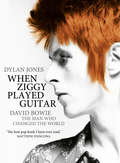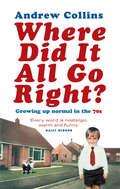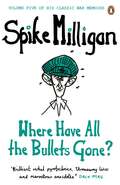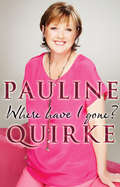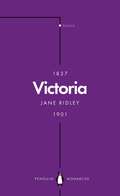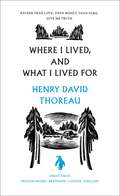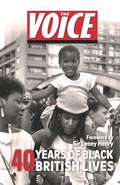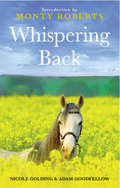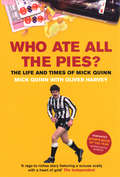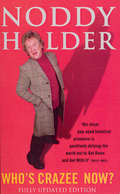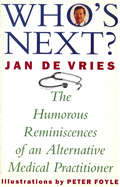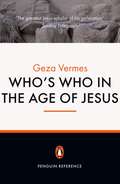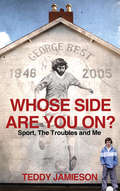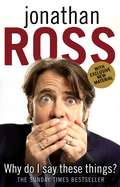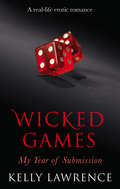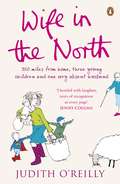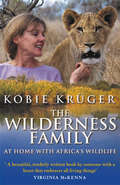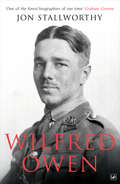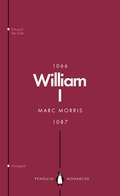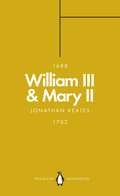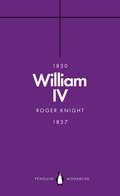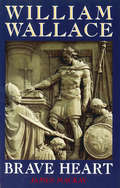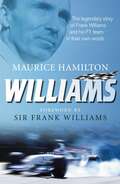- Table View
- List View
When Ziggy Played Guitar: David Bowie, The Man Who Changed The World
by Dylan JonesAnd then there was David Bowie, the uber-freak with the mismatched pupils, the low-tech space face from the planet Sparkle. This was Bowie's third appearance on TOTP but this was the one that properly resonated with its audience, the one that would go on to cause a seismic shift in the Zeitgeist. This is the performance that turned Bowie into a star, embedding his Ziggy Stardust persona into the nation's consciousness. With a tall, flame-orange cockade quiff (stolen from a Kansai Yamamoto model on the cover of Honey), lavishly applied make-up, white nail polish, and wearing a multi-coloured jump-suit that looked as though it were made from fluorescent fish skin (chosen by Ziggy co-shaper, the designer Freddie Buretti), and carrying a brand spanking new, blue acoustic guitar, a bone-thin Bowie appeared not so much as a pop singer, but rather as some sort of benevolent alien, a concept helped along by the provocative appearance of his guitarist, the chicken-headed Mick Ronson, with both of them unapologetically sporting knee-length patent leather wrestler's boots (Bowie's were red). 'Most people are scared of colour,' Bowie said later. 'Their lives are built up in shades of grey. It doesn't matter how straight the style is, make it brightly coloured material and everyone starts acting weird.' Suddenly Bowie - a man called alias - had the world at his nail-varnished fingertips, and in no time at all he would be the biggest star in the world.
Where Did It All Go Right?: Growing Up Normal in the 70s
by Andrew CollinsAndrew Collins was born 37 years ago in Northampton. His parents never split up, in fact they rarely exchanged a cross word. No-one abused him. Nobody died. He got on well with his brother and sister and none of his friends drowned in a canal. He has never stayed overnight in a hospital and has no emotional scars from his upbringing, except a slight lingering resentment that Anita Barker once mocked the stabilisers on his bike. Where Did It All Go Right? is a jealous memoir written by someone who occasionally wishes life had dealt him a few more juicy marketable blows. The author delves back into his first 18 years in search of something - anything - that might have left him deeply and irreparably damaged. With tales of bikes, telly, sweets, good health, domestic harmony and happy holidays, Andrew aims to bring a little hope to all those out there living with the emotional after-effects of a really nice childhood. Andrew Collins kept a diary from the age of five, so he really can remember what he had for tea everyday and what he did at school, excerpts from his diary run throughout the book and it is this detail which makes his story so compelling.
Vedi: Continents of Exile: 3 (Penguin Modern Classics)
by Ved MehtaBook 3 in Ved Mehta's Continents of Exile series. Nearly 50 years in the making, Continents of Exile is one of the great works of twentieth-century autobiography: the epic chronicle of an Indian family in the twentieth century. From 1930s India to 1950s Oxford and literary New York in the 1960s-80s, this is the story of the post-colonial twentieth century, as uniquely experienced and vividly recounted by Ved Mehta.Ved continues the story of Ved Mehta's two earlier memoirs, Daddyji, a biographical portrait of his father, and Mamaji, an exploration of his mother and her history. The focus here turns toward Mehta's childhood, his education in an Indian orphanage for the blind, and the general experience of blind people in India.
Where Have All the Bullets Gone? (Spike Milligan War Memoirs)
by Spike MilliganVOLUME FIVE OF SPIKE MILLIGAN'S LEGENDARY MEMOIRS IS A HILARIOUS, SUBVERSIVE FIRST-HAND ACCOUNT OF WW2'The Godfather of Alternative Comedy' Eddie Izzard______________ 'Back to those haunting days in Italy in 1944, at the foot of Mount Vesuvius, with lava running in great red rivulets down the slope towards us, and Jock taking a drag on his cigarette and saying, "I think we've got grounds for a rent rebate."' Where Have All the Bullets Gone? sees our hero dispatched from the front line to psychiatric hospital and from there to a rehabilitation camp. Considered loony (and 'unfit to be killed in combat by either side'), he becomes embroiled in his own private battle with melancholy. But it is music, wit and a little help from his friends - including one Gunner Harry Secombe - that help carry him through to his first stage appearances . . . ______________'Desperately funny, vivid, vulgar' Sunday Times 'Milligan is the Great God to all of us' John Cleese 'That absolutely glorious way of looking at things differently. A great man' Stephen Fry
Where Have I Gone?
by Pauline QuirkePauline Quirke was a skinny child, a slim teenager, a curvy woman, then - according to her bathroom scales (curse them) - just plain fat. Yes, the 'F' word. Tipping the scales at nearly 20 stone, with creaking knees and a dodgy ankle to boot, at the beginning of 2011 Pauline had reached a crisis point. Something had to change, and fast. It was never going to be an easy ride, but with her trademark warmth and sense of humour, Pauline recounts the highs and lows of the rollercoaster year in which she whips herself, and her life, into shape - with a fair few tales from her celebrated forty-year acting career thrown into the bargain. She reveals all: from the strain of working long hours away from home on one of Britain's most popular soaps to renewing her wedding vows and reuniting with her Birds of a Feather co-stars; from battling the bulge and facing the naysayers to rediscovering the joys of airline travel . . . without a seatbelt extension.Honest and revealing, Where Have I Gone? is brimming with brilliantly funny anecdotes and truly moving moments. So put your feet up and join Pauline as she embarks on the most incredible year of her life.
Victoria: Queen, Matriarch, Empress (Penguin Monarchs)
by Jane RidleyPart of the Penguin Monarchs series: short, fresh, expert accounts of England's rulers in a collectible formatQueen Victoria inherited the throne at 18 and went on to become the longest-reigning female monarch in history, in a time of intense industrial, cultural, political, scientific and military change within the United Kingdom and great imperial expansion outside of it (she was made Empress of India in 1876). Overturning the established picture of the dour old lady, this is a fresh and engaging portrait from one of our most talented royal biographers.Jane Ridley is Professor of Modern History at Buckingham University, where she teaches a course on biography. Her previous books include The Young Disraeli; a study of Edwin Lutyens, The Architect and his Wife, which won the 2003 Duff Cooper Prize; and the best-selling Bertie: A Life of Edward VII. A Fellow of the Royal Society for Literature, Ridley writes for the Spectator and other newspapers, and has appeared on radio and several television documentaries. She lives in London and Scotland.
Where I Lived, and What I Lived For (Penguin Great Ideas)
by Henry ThoreauThroughout history, some books have changed the world. They have transformed the way we see ourselves - and each other. They have inspired debate, dissent, war and revolution. They have enlightened, outraged, provoked and comforted. They have enriched lives - and destroyed them. Now Penguin brings you the works of the great thinkers, pioneers, radicals and visionaries whose ideas shook civilization and helped make us who we are.Thoreau's account of his solitary and self-sufficient home in the New England woods remains an inspiration to the environmental movement - a call to his fellow men to abandon their striving, materialistic existences of 'quiet desperation' for a simple life within their means, finding spiritual truth through awareness of the sheer beauty of their surroundings.
The Voice: 40 years of Black British Lives
by The VoiceLaunched at the 1982 Notting Hill Carnival, The Voice newspaper captured and addressed a generation figuring out what it meant to be Black and British. Written for and by Black people, the newspaper shone a light on systematic injustices as well as celebrating Black Britain's success stories. From hard hitting news reports covering the murder of Stephen Lawrence to championing the likes of Sir Lewis Hamilton and Idris Elba, the newspaper has campaigned, celebrated and educated people for the last forty years.As well as celebrating amazing successes in sport, politics and the arts, The Voice documented everyday life in the community, from the emergence of a Black middle class in the '90s and the achievements of Black entrepreneurs to how different facets of the community were explored in contemporary music and literature. Since its small beginnings in Hackney, The Voice has also become a fantastic training ground for prominent journalists and figures including former politician Trevor Phillips, broadcaster Rageh Omaar and writer Afua Hirsch. Today, The Voice is Britain's longest running and only Black newspaper.Told through news reports, editorials and readers' personal letters, this emotive book documents the social history of Black Britain over the last four decades. Each chapter is illustrated with amazing newspaper pages from The Voice's extensive archives as well as iconic and dramatic front covers from 1982 to the present day.With a foreword from Sir Lenny Henry and written by former and current Voice journalists, this powerful book is a celebration of the ground-breaking paper which gave a voice to the voiceless.
Whispering Back: Tales From A Stable in the English Countryside
by Adam Goodfellow Nicole GoldingAdam Goodfellow and Nicole Golding run a stable in the Cotswolds and specialise in curing problem horses. It's never an easy task, and often requires changing the habits of the owner as much as the horse. The pair have travelled a long way to get where they are today - but they've been united by a common passion. After a chance meeting with Monty Roberts, they gave up everything to live out their dreams and show that it's possible for ordinary people to become 'horse whisperers'. Their world is extraordinary, particularly through their unusual methods of teaching, and as you meet the cast of characters, both animals and humans, that surround them, you'll find it impossible not to be won over by their life.
Who Ate All The Pies? The Life and Times of Mick Quinn
by Mick Quinn Oliver HarveyMick Quinn, the boy from a Liverpool council estate dubbed 'Little Beirut', always loved his birds, booze and betting. They said Mick had a sixth sense for great accuracy in his playing days - he could find a party from any range. Quinn says he only put £50 on each horse race - but liked to stay in the bookies for twenty races a day!Sentenced in 1987 to three weeks in prison for twice driving whilst banned, Mick's been accused of punching Peter Schmeichel on the football pitch and John Fashanu off it. On retirement, though, Quinn switched to horse racing, the Sport of Kings, but controversy led the blue bloods of racing to hang the scouse oik out to dry and he was suspended from training for two and a half years.Who Ate All The Pies? is the funniest and most honest football book you'll read for a long, long time.
Who's Crazee Now?: My Autobiography
by Lisa Verrico Noddy HolderAs lead singer and extraordinary frontman of SLADE, Noddy Holder was one of the most successful musicians of the '70s and '80s. The epitome of the Glam Rock look and lifestyle, they released anthem after anthem as they mixed pure pop madness with football chant choruses. Seemingly on a mission to corrupt the spelling of a generation, the hits are songs we still hold dear today: MAMA WEER ALL CRAZEE NOW, LOOK WOT YOU DUN, CUM ON FEEL THE NOIZE. . . In a short few years they had 12 top five hits, 6 of them making #1 spot. Their albums also topped the charts and their huge Christmas anthem MERRY CHRISTMAS EVERYBODY has entered the top twenty over 7 times. In the '80s Slade made a brilliant revival with even more hits, especially RUN RUN AWAY and the classic MY OH MY. Today Noddy is as loved by the British public as he has ever been and in this hilarious autobiography he will tell us his complete life story, from growing up in the Midlands, to performing in the working men's clubs. The information of their first group, The N'Betweens and the mutation into an unlikely skinhead group, Ambrose Slade. And then, of course, Glam Rock and all the excesses of lifestyle that accompanied the outrageous clothes, not to mention guitarist Dave Hill's incredible hair style.
Who's Next?: The Humorous Reminiscences of an Alternative Medical Practitioner
by Jan de VriesReaders of Jan de Vries' immensely popular health books will already appreciate the wisdom and wit of 'the healing Dutchman'. Now, in Who's Next?, de Vries shares many of his most humorous experiences over almost three decades of practicing medicine.Highly anecdotal, Who's Next? is a frequently amusing, occasionally poignant book offering insights into what it is that makes so many thousands of people turn to the highly individual approach Jan de Vries has to health and healing. His experiences have ranged from the weird to the wonderful and have contributed to the person he has become: his fascination with people and his love of nature, his fine attention to detail and understanding of sensitive problems are all rounded off by a strong and appealing sense of humour. Who's Next? shows to good effect this side of the remarkable Scottish-based alternative medical practitioner.
Who's Who in the Age of Jesus
by Dr Geza VermesThe books of the New Testament are some of the most extraordinary documents ever created - brilliant, vivid works central to the lives of many millions of readers over the centuries. Yet, the picture they give of Jesus' world is a very partial one. Written thirty to eighty years after the events they describe and with very specific doctrinal aims they addressed a Greek-speaking audience when Christianity was at its most precarious. Geza Vermes, one of the world's foremost biblical scholars, is uniquely positioned to guide the reader through the many conundrums presented by the New Testament. Who's Who in the Age of Jesus is an ambitious and enjoyable attempt to sift through all the sources for the period to create biographies of the major (and some fascinating minor) figures from Jesus' era. The book allows readers to understand a Jewish, Roman and Hellenistic world crowded with explosive, mutually antagonistic groups - a world which would give rise both to a new Judaism and ultimately to Christianity. From detailed, convincing portraits of Jesus, John the Baptist, Pontius Pilate, Herod and other key New Testament figures to the Jewish and Roman leaders like Hillel, Caiaphas, Augustus, Vespasian and Titus, hardly or not at all mentioned in the Gospels or the Acts of the Apostles, Geza Vermes' illustrated Who's Who will throw much fresh light on the age of Jesus and provoke innumerable arguments and discussions.
Whose Side Are You On?
by Teddy JamiesonFrom the late 1960s, Northern Ireland has been mired in violence. Yet it has had seen more than its fair share of sporting heroes - from footballer George Best, through snooker champion Alex Higgins, to boxer Barry McGuigan. Life was tough for these working-class lads, but they could shine on the football field or find refuge at the town boxing club. For other kids, like the young Teddy Jamieson, a knockabout in the back-lanes was as good as it got, but at least they had their heroes. Watching McGuigan on telly, Teddy could feel proud to be Northern Irish. But sport - like everything else in Northern Ireland - could quickly turn nasty when politics were involved. This extraordinary journey through sport and the Troubles has it all: from Olympic gold-medals to Gaelic football; from death threats to reconciliations. Then there is Teddy's own story, as we learn how the age-old playground question 'Whose side are you on?' doesn't always have an easy answer.
Why Do I Say These Things?
by Jonathan RossWhy is catalogue shopping responsible for Jonathan Ross's inimitable sense of style?Why might wearing cape and mask be a fast track to heaven?Why does Jonathan wince every time he sees a Hoover?And why did he fall in love with a deep-sea diver?Why? Because this is Jonathan Ross. And nothing is out of bounds when it comes to talking about life as he knows it. From sex and pugs to rock 'n' roll and genital warts, Jonathan holds forth as only he can. This sharply observed, laugh-out-loud, outrageous page-turner will leave you asking just one question . . . Why didn't he write it sooner?
Wicked Games
by Kelly Lawrence‘Looking back, I think I knew I was in trouble the first time I met him. The road he took me down was at once both more liberating than I could have dreamed of, and yet more intense than I could cope with. If the path of love doesn’t always run smooth ... then how much more crooked it becomes when mixed with raw desire.’This is no novel, but the memoir of an intense, exciting and at times unsettling relationship. Alex, for all his charms, is no billionaire playboy, and Kelly is no blushing virgin; rather your typical, overworked teacher who has no time for games, certainly not the wicked games he leads her into. Games that she ends up craving like a drug…
Wife in the North
by Judith O'ReillyHow far would you go to be the perfect mother? The hilarious Wife in the North by Judith O'Reilly, based on her enormously popular blog, recounts one woman's attempt to move her family and her life from cosmopolitan London to rural Northumberland.Maybe hormones ate her brain. How else did Judith's husband persuade her to give up her career and move from her beloved London to Northumberland with two toddlers in tow? Pregnant with number 3 Judith is about to discover that there are one or two things about life in the country that no one told her about: that she'd be making friends with people who believed in the four horsemen of the apocalypse; that running out of petrol could be a near death experience and that the closest thing to an ethnic minority would be a redhead. Judith tries to do that simple thing that women do, make hers a happy family. A family that might live happily ever after. Possibly even up North ...'Genuinely funny and genuinely moving' Jane Fallon, author of Getting Rid of Matthew'Cold Comfort Farm with booster seats. Funny, honest and moving' Stephanie Calman, author of Confessions of a Bad Mother'I howled with laughter, tears of recognition at every page' Jenny Colgan'Funny, poignant and beautifully written' Lisa JewellJudith O'Reilly, a journalist and the mother of three young children, was persuaded to move from London to Northumberland by her husband in August 2005. She started a blog, wifeinthenorth.com, in November 2006, which quickly picked up fans around the world with its witty tales of family and country life. Her second book A Year of Doing Good is published by Penguin.
The Wilderness Family
by Kobie KrugerWhen Kobie Krüger, her game-ranger husband and their three young daughters moved to one of the most isolated corners of the world - a remote ranger station in the Mahlangeni region of South Africa's vast Kruger National Park - she might have worried that she would become engulfed with loneliness and boredom. Yet, for Kobie and her family, the seventeen years spent in this spectacularly beautiful park proved to be the most magical - and occasionally the most hair-raising - of their lives.Kobie recounts their enchanting adventures and extraordinary experiences in this vast reserve - a place where, bathed in golden sunlight, hippos basked in the glittering waters of the Letaba River, storks and herons perched along the shoreline, and fruit bats hung in the sausage trees.But as the Krugers settled in, they discovered that not all was peace and harmony. They soon became accustomed to living with the unexpected: the sneaky hyenas who stole blankets and cooking pots, the sinister-looking pythons that slithered into the house, and the usually placid elephants who grew foul-tempered in the violent heat of the summer. And one terrible day, a lion attacked Kobus in the bush and nearly killed him.Yet nothing prepared the Krugers for their greatest adventure of all, the raising of an orphaned prince, a lion cub who, when they found him, was only a few days old and on the verge of death. Reared on a cocktail of love and bottles of fat-enriched milk, Leo soon became an affectionate, rambunctious and adored member of the fmaily. It is the rearing of this young king, and the hilarious endeavours to teach him to become a 'real' lion who could survive with his own kind in the wild, that lie at the heart of this endearing memoir. It is a memoir of a magical place and time that can never be recaptured.
Wilfred Owen
by Jon StallworthyOf all the poets of the First World War, Wilfred Owen most fires the imagination today – this is the comprehensive literary biography of the greatest WW1 poetWilfred Owen tragically died in battle just a few days before the Armistice. Now, during the centenary year of his death, this biography honours Owen’s brief yet remarkable life, and the enduring legacy he left. Stallworthy covers his life from the childhood spent in the backstreets of Shrewsbury to the appalling final months in the trenches. More than a simple account of his life, it is also a poet's enquiry into the workings of a poet's mind. This revised edition contains the beautiful illustrations of the original edition, including the drawings by Owen and facsimile manuscripts of his greatest poems, as well as a new preface by the author.‘One of the finest biographies of our time.’ Graham Greene‘An outstanding book, a worthy memorial to its subject.’ Kingsley Amis ‘As lovingly detailed as the records of Owen's short life permit, but it is always fascinatingly readable, in fact engrossing.’ Sunday Telegraph
William I: England's Conqueror (Penguin Monarchs)
by Marc MorrisOn Christmas Day 1066, William, duke of Normandy was crowned in Westminster, the first Norman king of England. It was a disaster: soldiers outside, thinking shouts of acclamation were treachery, torched the surrounding buildings. To later chroniclers, it was an omen of the catastrophes to come.During the reign of William the Conqueror, England experienced greater and more seismic change than at any point before or since. Marc Morris's concise and gripping biography sifts through the sources of the time to give a fresh view of the man who changed England more than any other, as old ruling elites were swept away, enemies at home and abroad (including those in his closest family) were crushed, swathes of the country were devastated and the map of the nation itself was redrawn, giving greater power than ever to the king. When, towards the end of his reign, William undertook a great survey of his new lands, his subjects compared it to the last judgement of God, the Domesday Book. England had been transformed forever.
William II: The Red King (Penguin Monarchs)
by John GillinghamWilliam II (1087-1100), or William Rufus, will always be most famous for his death: killed by an arrow while out hunting, perhaps through accident or perhaps murder. But, as John Gillingham makes clear in this elegant book, as the son and successor to William the Conqueror it was William Rufus who had to establish permanent Norman rule. A ruthless, irascible man, he frequently argued acrimoniously with his older brother Robert over their father's inheritance - but he also handed out effective justice, leaving as his legacy one of the most extraordinary of all medieval buildings, Westminster Hall.
William III & Mary II: Partners in Revolution (Penguin Monarchs)
by Jonathan KeatesWilliam III (1689-1702) & Mary II (1689-94) (Britain's only ever 'joint monarchs') changed the course of the entire country's history, coming to power through a coup (which involved Mary betraying her own father), reestablishing parliament on a new footing and, through commiting Britain to fighting France, initiating an immensely long period of warfare and colonial expansion. Jonathan Keates' wonderful book makes both monarchs vivid, the cold, shrewd 'Dutch' William and the shortlived Mary, whose life and death inspired Purcell to write some of his greatest music.
William IV: A King at Sea (Penguin Monarchs)
by Roger KnightWilliam IV, the 'Sailor King', reigned for just seven years. Rash and impetuous as a young man, he was sent to join the navy by his father, George III, to bring him to order, but he was overpromoted at an early age and saw his years of active service marked by a series of calamities. He was also notorious for his mounting debts and his long relationship with the actress Mrs Jordan, with whom he had ten children.Yet, as Roger Knight, one of Britain's foremost naval historians, shows in this concise and perceptive biography, William's bluff, unpolished sailor's manner made him popular with the people. Inheriting the throne amid strikes, riots and the push for parliamentary reform, he helped see the country through the great constitutional crisis of the era. Despite his many flaws, he was perhaps a better king than sailor, leaving the monarchy in a healthier state than when he found it, and enabling the smooth succession of his niece, Victoria.
William Wallace: Brave Heart
by Dr James MackaySir William Wallace of Ellerslie is one of history's greatest heroes, but also one of its greatest enigmas - a shadowy figure whose edges have been blurred by myth and legend. Even the date and place of his birth have been mis-stated - until now. James Mackay uses all his skills as a historical detective to produce this definitive biography, telling the incredible story of a man who, without wealth or noble birth, rose to become Guardian of Scotland. William Wallace, with superb generalship and tactical genius, led a country with no previous warlike tradition to triumph gloriously over the much larger, better-armed and better-trained English forces. Seven hundred years later, the heroism and betrayal, the valiant deeds and the dark atrocities, and the struggle of a small nation against a brutal and powerful empire, still create a compelling tale.
Williams: The legendary story of Frank Williams and his F1 team in their own words
by Maurice HamiltonA story of true drive – now the topic of a major documentaryFounded in 1977 by Sir Frank Williams and Patrick Head, Williams F1 represents the last of the true independent teams; a company devoid of corporate dogma and run by enthusiasts driven by a love of racing and the satisfaction that comes with beating the rest of the world. Since its first Grand Prix victory at Silverstone on 14 July 1979, the team has won a further 116 GPs, delivered seven World Champions - among them Nigel Mansell and Damon Hill - and won nine Constructors Championships.This is the definitive history of the Williams team as told by those who have worked for Williams past and present. At the heart of the book are Sir Frank's personal recollections, along with memories and anecdotes from those at every level: from the shop floor to the upper strata of management; from the mechanics and machinists to the drivers - Mansell, Hill, Alain Prost and Alan Jones among them. It relates both the incredible highs of winning against the odds while never shying the terrible lows - the tragic deaths of Piers Courage in 1970 and Ayrton Senna in 1994 among them.Conveying the history and soul of a unique band of people, Williams F1 explains exactly why the Williams team is held in more affection than any other team in Britain, if not the world.
